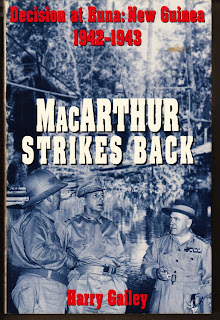Bought
at
a school fair
the day of the Australian election battle , this book claims that General Douglas MacArthur made his
famous statement, “ I shall return [to the Philippines ] ” in Darwin soon after he arrived
in Australia . This came as a
surprise as it is
the first time I had read such a statement. Prior
to
this , I had regarded
the former railway
terminus
town of Terowie
, South Australia, as the place where
he declared his intention . Indeed there was a plaque
to that effect
when I visited the town some 20 years ago ,
which at the
time had a shop
which specialised in doilies and another
old wares business, the latter closed
at the
time , an
overall air of desolation , its wide main street making it an
ideal setting
for a High Noon shoot-
out movie. Today , The Historic Town of
Terowie website contains the
following:
Terowie became a
large military camp in 1942. When US General Douglas MacArthur arrived on our platform
in March 1942
with his wife and
son after escaping from the
Philippines and his famous words "l came out of Bataan and I
shall return" were reported
here.
However , the book, published in 2000 by Presidio Press, California , USA , tells
a different story. On page
13, author Gailey says the
general , his family, and 17 senior staff officers escaped the Japanese
in two battered
B-17 planes and landed
at Batchelor
Field, south of
Darwin . It goes
on
to say that on
March 17, 1942 , the
general met reporters
in Darwin and used the phrase : “I shall return.” From Darwin, most of his staff ,
the “Bataan Gang, “ flew to Melbourne . Macarthur , his wife and son made the
long rail
trip to Alice Springs , the book erroneously
continues. Part of the
journey must have been by vehicle
as the line stopped
at Birdum , a long way from Alice , where the rail ran through to South Australia .
During WW11, Kilgariff was a sergeant in the 2/5th Battalion , AIF; he and several other soldiers signed this Japanese flag
which had been souvenired
during
fighting on the Kokoda Track. Over the years , the
signatures faded badly
and NT Police
Force forensic expertt, Kym
Chilton, of Darwin,
was able to use
special lighting to draw up
a complete list of
the
signatories. Kilgariff had the
flag framed and it
is now believed to be in the Alice Springs RSL.
Another source of
first- hand information about
the general was Les
Penhall, a clerk with
the Native Affairs
Department in Darwin
the day it was bombed for
the first time, February 19, l942. He
and three other clerks travelled
to Alice Springs
in a truck
under the direction of
Police Superintendent , Alf Stretton
. Arriving late at
night in Alice, Penhall, 18, bunked down in a
police cell . One of the
tasks he was
given was that of helping
compile a list
of crewmembers, many of them
Chinese
and Malays , off ships
sunk in Darwin ,
who were brought
south in convoys.
*** This interesting book is dedicated to the Australian and American soldiers who , in the deadly Papuan campaign, reversed the Japanese advance in the Pacific. In dealing with the battle at Milne Bay , where the Japanese suffered their first defeat, there is brief mention of the episode in which the Australian , Corporal John French , destroyed three machine gun positions before being killed , posthumously awarded the Victoria Cross . His name and photograph can be seen on the above Townsville waterfront Heroes' Way memorial . The late NT crusading editor , Jim Bowditch, was present at the time and saw French charge and then fall . His account of the fierce battle has appeared in the Bowditch biog being serialised in Little Darwin. The school fair book was an affectionate Christmas gift to someone called “Pooh”. ( By Peter Simon ).





